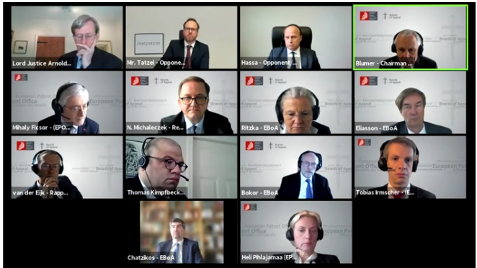

ViCo oral proceedings in case no. G 1/21 were held on 28 May 2021.
On Friday 28 May 2021 oral proceedings were held before the Enlarged Board of Appeal in the high-profile referral case no. G 1/21.
"Public proceedings finally resumed at around 13:00 when the chairman of the Enlarged Board announced that the appellant's partiality objections had been rejected as "inadmissible"."This is understood to mean that the Enlarged Board didn't actually rule on the merits of the appellant's objections but rather decided not to admit them to the proceedings, presumably on the basis of some legal technicality, for example that they had been late-filed.
Further analysis on this point will have to await the Enlarged Board's written decision.
However, this was not the end of the discussion about formalities. The Enlarged Board was unable to proceed and discuss the substantial legal aspects of the case because, in addition to its partiality objections, the appellant had also raised an objection about a breach of its right to be heard.
"The Enlarged Board was unable to proceed and discuss the substantial legal aspects of the case because, in addition to its partiality objections, the appellant had also raised an objection about a breach of its right to be heard."More specifically the appellant objected that it had not been given sufficient time to consider and respond to the President's submissions on the referral. As a matter of fact, the appellant had only received formal notification of these submissions a few days before the hearing.
According to the appellant's representatives, such a short period of time was not enough for them to discuss the submissions with their client (especially given that their client had been on holiday at the time in question).
The appellant complained that the Enlarged Board's actions breached its right to be heard as explicitly provided for under Article 9 of the Rules of Procedure of the Enlarged Board of Appeal (RPEBA).
This led to a further round of discussion in public.
"The appellant complained that the Enlarged Board's actions breached its right to be heard as explicitly provided for under Article 9 of the Rules of Procedure of the Enlarged Board of Appeal (RPEBA)."The representative of the President argued that the President's comments had been published on the EPO website for all to see on 28 April 2021 and had been widely reported and discussed. It was argued from this quarter that the appellant should have been aware of the President's comments well before they received the formal notification from the EPO.
The appellant countered that it could not be expected to continuously monitor for submissions published somewhere on the EPO website. What was at stake here was the appellant's right to a proper formal notification of the submissions which safeguarded the right to respond guaranteed under Article 9 RPEBA.
After the public discussion, the chairman announced a break for deliberation.
"However, it is difficult to see how this admirable aspiration squares with the fact that it took the Board about 6 hours to work out that it had overlooked its own procedural rules, in particular the appellant's right to be heard in accordance with Article 9 RPEBA."The proceedings resumed some time shortly after 15:00.
The chairman announced that the Enlarged Board had decided on an adjournment of the proceedings to allow the appellant to prepare a written response to the submissions of the EPO President and that the proceedings would resume during the first week of July.
In announcing the decision, chairman expressed the desire of the Enlarged Board to deal with case G€ 1/21 in “a timely manner.”
However, it is difficult to see how this admirable aspiration squares with the fact that it took the Board about 6 hours to work out that it had overlooked its own procedural rules, in particular the appellant's right to be heard in accordance with Article 9 RPEBA.
It is worth recalling that the proceedings of 28 May were originally scheduled by Josefsson in a cynical and manipulative attempt to rubber-stamp his own decision as quickly as possible.
If the Enlarged Board had rescheduled the proceedings – as it should have done – that would not only have given the newly composed panel sufficient time to take stock of the case. It would also have given the appellant a proper opportunity to exercise its rights under Article 9 RPEBA.
The fact that such a course of action was not adopted in the aftermath of the intermediate decision of 17 May indicates that everything is being done in this case to prioritise "speed" at the expense of "diligence" (to quote the appellant).
"All in all, it doesn't augur well for the state of judicial independence at the EPO."The judicial actors involved in the case will undoubtedly attempt to justify their actions - at least among themselves - from the perspective of "political expediency".
However, to the outside observer they seem to be acting in a manner which is both legally and ethically questionable.
All in all, it doesn't augur well for the state of judicial independence at the EPO.
In the next part we will turn our attention to some of the other participants in the oral proceedings of 28 May, more specifically the legal team representing the EPO President. ⬆